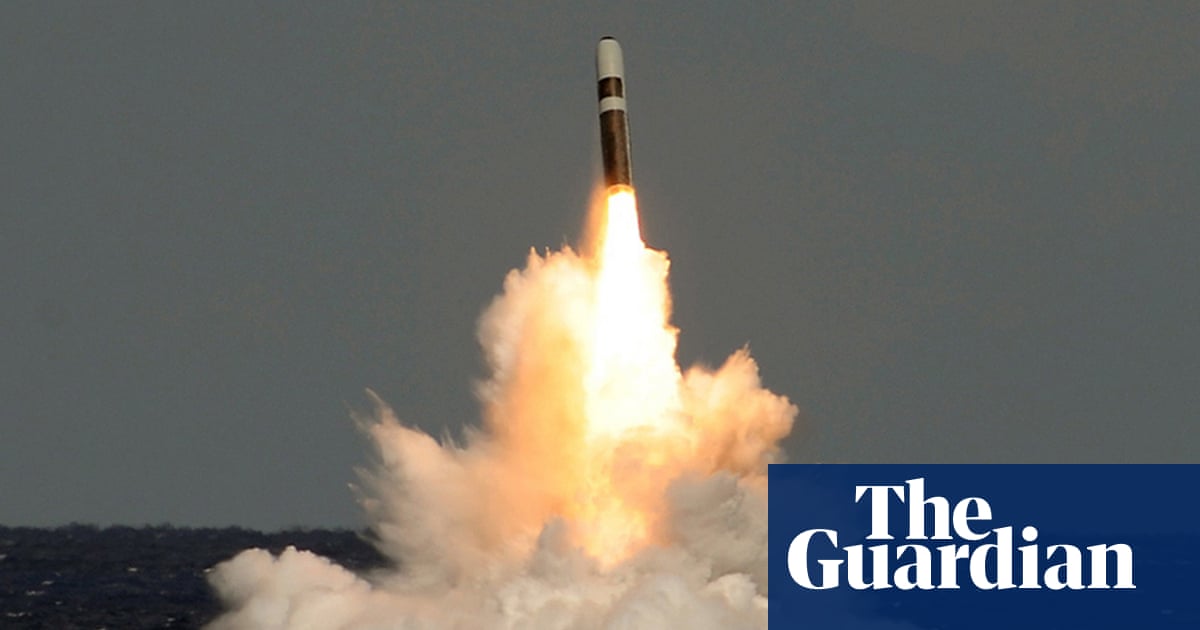A Trident nuclear missile failed, plopping into the Atlantic during a test launch attended by the British defence secretary last month, raising questions about the efficiency and effectiveness of Britain’s nuclear deterrent.
The Ministry of Defence said that an “anomaly occurred” during the exercise involving the submarine HMS Vanguard on 30 January that was “event specific”, implying it would not have happened in the unlikely event of a war.
No further details about the embarrassing failure were provided, although the MoD insisted that “there are no implications for the reliability of the wider Trident missile systems and stockpile”. Defence sources added that Grant Shapps was present at the time the test took place.
Subsequently, Tobias Ellwood, the former chair of the defence select committee, said in an interview with GB News that the problems related to testing gear. “I understand it was some equipment that was actually attached to the missile itself that prevented the firing of the rocket system after the missile had left the submarine,” the MP said.
Nuclear firing systems are complex and rarely tested and failures common, but it is the second time in a row a Trident missile try-out has gone wrong. In 2016, a missile that had been fired had to be destroyed after going off course. Instead of heading towards Africa it ended up veering towards the US.
The MoD had not intended to release a statement about the failure, although there was speculation among experts why a scheduled test expected around the end of January did not appear to have taken place. It had been intended for the missile to fly about 6,000km into the middle of the Atlantic between Africa and Brazil, according to warnings issued to mariners.
It was prompted to go public after a report in the Sun. According to an anonymous source quoted by the newspaper, the missile simply splashed into the ocean: “It left the submarine but it just went plop, right next to them.”
Labour called for assurances over the effectiveness of Britain’s nuclear deterrent. The shadow defence secretary, John Healey, said: “Reports of a Trident test failure are concerning. The defence secretary will want to reassure parliament that this test has no impact on the effectiveness of the UK’s deterrent operations.”
David Cullen, an expert with the Nuclear Information Service, a monitoring group, said the latest failure was more significant than 2016 “not only because it’s the second in a row, but because the Trident missiles have gone through a life extension programme, so the current stock should be more reliable than it was in 2016”.
He added: “The whole point of the hundreds of billions we are spending on the nuclear weapons programme is that it is supposed to work, and be seen to work, at the prime minister’s command. Without that assurance, the entire endeavour is a failure in its own terms.”
The Sun reported that a dummy Trident II missile was propelled into the air by compressed gas in its launch tube but that its so-called first-stage boosters did not ignite. Trident II missiles are also used by US submarines, and are built by Lockheed Martin, using rocket motors from Northrop Grumman.
The first sea lord, Adm Sir Ben Key, was also present at the time to mark what was the final exercise for Vanguard and its crew after a refit of the vessel that took more than seven years, an MoD spokesperson said.
An MoD spokesperson said: “HMS Vanguard and her crew have been proven fully capable of operating the UK’s continuous at-sea deterrent, passing all tests during a recent demonstration and shakedown operation, a routine test to confirm that the submarine can return to service following deep maintenance work. The test has reaffirmed the effectiveness of the UK’s nuclear deterrent, in which we have absolute confidence.
“During the test an anomaly occurred. As a matter of national security, we cannot provide further information on this; however, we are confident that the anomaly was event specific, and therefore there are no implications for the reliability of the wider Trident missile systems and stockpile. The UK’s nuclear deterrent remains safe, secure and effective.”
HMS Vanguard is one of four Vanguard-class nuclear submarines that first went on patrol in 1994, with one of the vessels continually at sea.
Each Vanguard-class submarine can hold up to 16 intercontinental ballistic missiles and will carry up to eight Trident rockets and up to 40 nuclear warheads, each capable of carrying a 100 kiloton bomb, over six times more powerful than the bomb dropped on Hiroshima in 1945.


